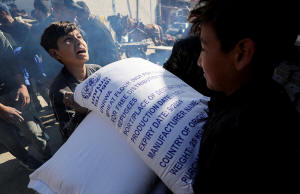Backs to the wall, Gazans fear Israeli assault on last refuge
 Send a link to a friend
Send a link to a friend
 [February 02, 2024]
By Nidal al-Mughrabi [February 02, 2024]
By Nidal al-Mughrabi
(Reuters) -Israeli forces shelled the outskirts of the last refuge on
the southern edge of the Gaza Strip on Friday, where the displaced,
penned against the border fence in their hundreds of thousands, said
they feared a new assault with nowhere left to flee.
More than half of Gaza's 2.3 million residents are now homeless and
crammed into Rafah. Tens of thousands more have arrived in recent days,
carrying belongings in their arms and pulling children on carts, since
Israeli forces launched one of the biggest assaults of the war last week
to capture Khan Younis, the main southern city, just to the north of
Rafah.
If the Israeli tanks keep coming, "we will be left with two choices:
stay and die or climb the walls into Egypt", said Emad, 55, a
businessman and father of six, reached on a mobile phone chat app.
"Most of Gaza's population are in Rafah. If the tanks storm in, it will
be a massacre like never before during this war."
Israeli Defence Minister Yoav Gallant said late on Thursday that troops
would now turn to Rafah, which along with Deir al-Balah just north of
Khan Younis is among the last remaining areas they have yet to storm in
an almost four-month assault.
"We are achieving our missions in Khan Younis, and we will also reach
Rafah and eliminate terror elements that threaten us," Gallant said in a
statement.
As the only part of Gaza with access to the limited food and medical aid
trickling across the border, Rafah and adjacent parts of Khan Younis
have become a teeming warren of makeshift tents clinging to the winter
mud.

Wind and cold weather added to the misery, blowing tents down, flooding
them and the ground between them.
"What should we do? We live in multiple miseries, a war, starvation, and
now the rain," said Um Badri, a mother of five displaced from Gaza City,
now living in a tent in Khan Younis, also reached by phone chat.
"We used to wait for winter, to enjoy watching the rain from the balcony
of our house. Now, our house is gone, and the rainwater has flooded the
tent we have ended up in."
TRUCE OFFER
The Gaza war was triggered by Hamas fighters who stormed across the
border fence into Israel on Oct. 7, killing 1,200 people and capturing
253 hostages, according to Israeli tallies.
Since then, Gaza health authorities say more than 27,000 Palestinians
have been confirmed killed, with thousands more bodies feared lost among
the ruins, in an Israeli assault that has laid much of the territory to
waste.
Mediators are waiting for a response from Hamas, the militant group that
runs Gaza, to a proposal drafted last week with Israeli and U.S. spy
chiefs and passed on by Egypt and Qatar, for the first extended
ceasefire of the war. Residents hope that would stop the fighting before
the tanks enter Rafah.
There was brief celebratory gunfire in Gaza on Thursday when
Arabic-language media reported comments by a Qatari official suggesting
the ceasefire was close. But Qatar made clear a deal had not yet been
reached.
The only truce so far lasted for only a week in late November, when
militants freed 110 women, children and foreign hostages.
[to top of second column]
|

Palestinians gather to receive bags of flour distributed by the
United Nations Relief and Works Agency (UNRWA), amid the ongoing
conflict between Israel and Palestinian Islamist group Hamas, in
Rafah in the southern Gaza Strip February 1, 2024. REUTERS/Ibraheem
Abu Mustafa/File Photo

The proposal now on the table would be for a far longer cessation of
hostilities, letting aid reach the enclave and Gazans return to
abandoned homes. One Palestinian official said it envisages a first
phase lasting 40 days, during which Hamas would free remaining
civilian hostages, followed by further phases to release soldiers
and hand over the bodies of the dead.
But the sides remain far apart over what would follow.
Israel says Hamas must be eradicated before it pulls its troops out
of Gaza or releases detainees. Hamas says it will not disband, and
will not sign any truce deal or give up hostages without an
agreement for Israel to pull out and end the war.
REGIONAL JITTERS
The Middle East is also on edge about the prospect of U.S. strikes
on pro-Iranian militia in Syria and Iraq, potentially leading to
further escalation, following the killing of three U.S. soldiers
last Saturday in a drone strike in Jordan.
Washington has said it is preparing to retaliate for the attack, the
first time its soldiers were killed in a wave of escalatory violence
across the region by pro-Iranian groups since the Gaza war began.
U.S. President Joe Biden, under pressure to take firm action without
starting a wider war with Iran, has said he has already decided on a
response, which U.S. officials say will involve strikes over
multiple days. Tehran says it will respond.
"We will not start any war, but if anyone wants to bully us they
will receive a strong response," President Ebrahim Raisi said in a
televised speech.
Since December, several senior commanders of Iran's elite
Revolutionary Guards advising the Syrian government have been killed
in presumed Israeli air strikes on Syria. Iranian semi-official
media reported on Friday that a Guards adviser had been killed in
yet another Israeli strike on Damascus.
Syrian state media said Syria had shot down missiles fired from
Israel. Israel declined to comment, in line with its regular policy.
Reuters reported on Thursday that Iran was scaling back the
deployment of its Guards in Syria in response to the Israeli
strikes.
The Iraq-based pro-Iranian group Washington blames for the deadly
attack on its troops in Jordan, Kataib Hezbollah, has said it is
suspending military action against the United States to avoid
embarrassing the Baghdad government. But another Iraq-based group,
Nujaba, which has also been targeted in U.S. strikes since the start
of the Gaza war, said on Friday it would continue attacking the
Americans.
(Reporting by Nidal al-Mughrabi in Doha and Reuters bureauxWriting
by Peter GraffEditing by Gareth Jones)
[© 2024 Thomson Reuters. All rights reserved.]This material
may not be published, broadcast, rewritten or redistributed.
Thompson Reuters is solely responsible for this content.
 |